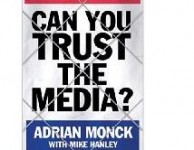Should the media be concerned about trust?

Extracted from Can You Trust the Media? by Adrian Monck
# Hardcover: 256 pages
# Publisher: Icon Books Ltd (
# Language English
# ISBN-10: 1840468726
# ISBN-13: 978-1840468724
What¿s trust got to do with it?
Where does this trust obsession come from? The numbers show us that trust doesn¿t bring readers or viewers, but every -one from the Prime Minister down thinks it¿s important.
Why?
In
For the BBC, it all started at the beginning of the 2000s. If you look back through old reviews from the 1980s and 1990s, you¿ll see BBC News described as ¿authoritative¿. But in the 21st century, ¿authority¿ as a value has become seriously out of fashion. It implied distance and deference and it was difficult to measure. Our modern fixation with polling people and giving them what they want meant that the media industry no longer felt confident in its own judgements, instead handing leadership and content decisions over to a bunch of people who wouldn¿t know quality if it snuck up behind them and kicked their collective butts. The public, it turned out, thought it didn¿t want lectures from an authority figure; instead it wanted collegiality, phone-in polls, informality. It wanted to be able to ¿trust¿ what it was being told, but it didn¿t want to have to do anything it didn¿t want to, like exercise its brain cells.
¿Trust¿ looked like a good replacement for ¿authority¿, and trust could be backed with numbers. Polls found that although people don¿t trust the media overall, they trusted some bits much more than others. Tabloids fared worst, followed by partisan ¿quality¿ papers. Top of the trust heap were broadcasters. In a 2007 poll, broadcast journalists were considered twice as trustworthy as their local MP and three times as trustworthy as Tony Blair. Only 7 per cent of those polled thought that red-top reporters are trustworthy.
This trust data has been used to bolster the idea of media regulation. Broadcast journalists are highly regarded because they are highly regulated, runs the argument, not just because they have big audiences.Ever since its establishment, British broadcasting had been governed by regulations that said its news had to show due impartiality and fairness.
Editors had achieved this principally by avoiding political controversy, or by adopting a seesaw, ¿he said/she said¿ style of presentation, where every contentious point is matched by an uncontentious counter point. Faced with the divisive social issues of the 1970s and 1980s like Northern Irish terrorism and industrial disputes, television news did not take up arms on behalf of the proletariat, nor did it cheerlead for the British Army in
Back in the 1960s, in
What had newspapers done to lose favour and television to win it? Nothing.
The shift in trust reflected a shift in consumption. Quite simply, people trusted what they used, not vice versa. So firmly was that shift imprinted on public opinion that in the years following his retirement from presenting CBS News, anchor Walter Cronkite was still rated as the most trusted man in
Cronkite is still with us, but he is no longer as trusted. He hasn¿t been caught shoplifting or dodging taxes, but a couple of decades¿ absence from the nightly screens of Americans has eroded his trustworthiness. Cronkite has not been alone in experiencing this coastal erosion. TV might have overtaken newspapers in trust ratings but Americans¿ confidence in public institutions as a whole began to crumble as the twentieth century matured.
One of the best analyses of that shift is by two American academics, Paul Gronke and the late Timothy Cook. They looked back at years of polling data and concluded that these were the main attributes of people who said they trusted the media:
• Young
• Badly educated
• Poor
• Non-churchgoers
• Democrat
• Non-partisan
What made people distrust the media? Just switch it around to any one of these characteristics:
• Older
• University educated
• Wealthy
• Socially conservative
• Republican
• Highly partisan
And those attributes read something like the headline social and demographic changes in the
Americans who were older, smarter and better off were more sceptical of the news media, but they remained its most devoted audience.
Prof Adrian Monck is Head of Journalism at






